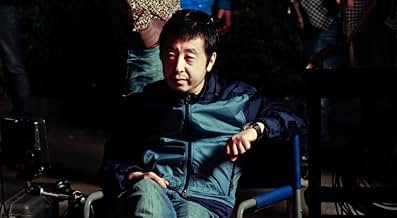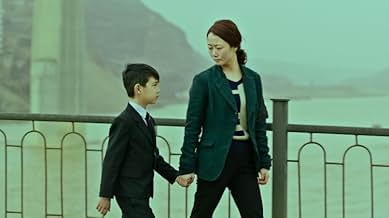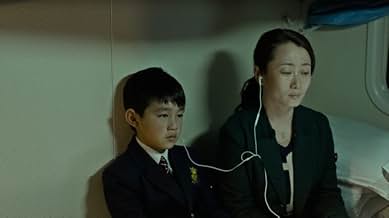AVALIAÇÃO DA IMDb
6,9/10
6,7 mil
SUA AVALIAÇÃO
Adicionar um enredo no seu idiomaThe life of Tao, and those close to her, is explored in three different time periods: 1999, 2014, and 2025.The life of Tao, and those close to her, is explored in three different time periods: 1999, 2014, and 2025.The life of Tao, and those close to her, is explored in three different time periods: 1999, 2014, and 2025.
- Direção
- Roteirista
- Artistas
- Prêmios
- 26 vitórias e 42 indicações no total
Yi Zhang
- Zhang Jinsheng
- (as Zhang Yi)
Zijian Dong
- Zhang Daole aka Dollar
- (as Dong Zijian)
Avaliações em destaque
Mountains May Depart, directed by Zhangke Jia, is a very fine Chinese drama, whose timeline spans some twenty-five years from the past, to the present, to the future, representing China in the modern age and possibly where it's headed. It is something that's quite unique and interesting. Jia was also the director of a movie I saw a few years ago called A Touch of Sin, and while I remember admiring that film (which is of a considerably darker subject matter than this one), it left me feeling a little cold, while I enjoyed the experience of Mountains May Depart more.
The main character in story, who is connected in one way or another to almost every other prominent person, is a woman named Tao Zhao, played by Shen Tao. She is the heart of the film even during much of the parts she's not in, playing it with empathy and truth in her journey, a very fine performance. There are two other good performances by Yi Zhang and Jing Dong Liang, and these three main character evolve significantly through time. But the main strength is a story dealing themes of class and materialism, and the cost of progress, put together in a way worthy of these universal human subjects.
Mountains does have some issues in the final of the three acts as it becomes a little odd--odd in a way that that might have worked with different material, but doesn't quite fit with the rest of this film. Still, this is an overall fascinating and moving experience, well-acted and written, making itself very relatable and is an impressive way to view these people over time.
The main character in story, who is connected in one way or another to almost every other prominent person, is a woman named Tao Zhao, played by Shen Tao. She is the heart of the film even during much of the parts she's not in, playing it with empathy and truth in her journey, a very fine performance. There are two other good performances by Yi Zhang and Jing Dong Liang, and these three main character evolve significantly through time. But the main strength is a story dealing themes of class and materialism, and the cost of progress, put together in a way worthy of these universal human subjects.
Mountains does have some issues in the final of the three acts as it becomes a little odd--odd in a way that that might have worked with different material, but doesn't quite fit with the rest of this film. Still, this is an overall fascinating and moving experience, well-acted and written, making itself very relatable and is an impressive way to view these people over time.
Mountains May Depart starts on perhaps my favourite opening shot of the year. Kicking it off with the Pet Shop Boys' vibrant song "Go West," we're straight in the middle of a dance routine with a room full of people clumsily bopping in sync. It's infectious and filled with unbridled hope and joy. Unfortunately, it's downhill from here, though the film is never aiming for the same type of exuberance. I'm not familiar with Jia Zhangke or his following – Walter Salles apparently has a hotly anticipated documentary about the director at this festival – but Mountains May Depart seems like an endearing and accessible introduction. Telling three stories in three separate time periods, I do enjoy the way it explores causality in how these small relationships and dramas at one time can feed into a dilemma 25 years later.
The first story, set during the turn of the century in 1999 when Chinese capitalism was healthy, follows a love triangle between Tao, an aerobics instructor, Zhang, an egotistic entrepreneur, and Liangzi, a man who works for Zhang. The three hang out as friends but Zhang can't bear the idea of Tao getting close to Liangzi and despite emotional logic, it's social economical pressures that make decisions. Cut to 2014, Tao and her beau have divorced and she's now estranged from her son. Upon the death of her father, her son is forced to visit and she must make the decision of how connected she should be to him throughout his life. Then off to an imagined Australia in 2025, her son doesn't remember her and currently struggles with his relationship with his father where they now have a language barrier. With the help of a teacher he grows attached to, he goes in search for Tao.
Each section of the film is approached in a different way, reminiscent of the way last year's The Grand Budapest Hotel and Mommy played with ratios. The first section is a tight 4:3, the second is a full frame, and the third is widescreen. However, these feel like they represent the period and the environment moreso than the character's emotions, with exception to the mid- section, which ideally captures Tao's regret and longing. It's a mixed bag depending on the talent, with some tender moments landing strong and some clumsily misguided, the latter most prominent in the last section. That first section has a bait and switch for the decades long heartache that the seemingly innocent love triangle causes. The theme of how people drift apart no matter how close they are resonates but it's unbearably melancholic without Zhangke offering much of a satisfying a silver lining.
It's a shame that despite the film's strengths it has too many loose ends and unnecessary moments that don't appear to add to the character arcs or the themes. With a 25 year story like this where no single character carries us through the whole film, every moment has to count to something. There's little justification as to why the third section is in glorious widescreen and set in Australia, but perhaps this just speaks to how disconnected it is from the rest of the film. While mostly drenched in Chinese culture, I wish Zhangke didn't resort to certain American clichés such as sad montages of characters having deep thoughts set to music. However, with those time gaps, Zhangke does harness a powerful nostalgic through just a few song motifs carried through all three sections that are well executed. Both disarmingly simple and complex, his ambition is admirable, but it doesn't quite reach the potential that this expanse allows it to travel.
7/10
Read more @ The Awards Circuit (http://www.awardscircuit.com/)
The first story, set during the turn of the century in 1999 when Chinese capitalism was healthy, follows a love triangle between Tao, an aerobics instructor, Zhang, an egotistic entrepreneur, and Liangzi, a man who works for Zhang. The three hang out as friends but Zhang can't bear the idea of Tao getting close to Liangzi and despite emotional logic, it's social economical pressures that make decisions. Cut to 2014, Tao and her beau have divorced and she's now estranged from her son. Upon the death of her father, her son is forced to visit and she must make the decision of how connected she should be to him throughout his life. Then off to an imagined Australia in 2025, her son doesn't remember her and currently struggles with his relationship with his father where they now have a language barrier. With the help of a teacher he grows attached to, he goes in search for Tao.
Each section of the film is approached in a different way, reminiscent of the way last year's The Grand Budapest Hotel and Mommy played with ratios. The first section is a tight 4:3, the second is a full frame, and the third is widescreen. However, these feel like they represent the period and the environment moreso than the character's emotions, with exception to the mid- section, which ideally captures Tao's regret and longing. It's a mixed bag depending on the talent, with some tender moments landing strong and some clumsily misguided, the latter most prominent in the last section. That first section has a bait and switch for the decades long heartache that the seemingly innocent love triangle causes. The theme of how people drift apart no matter how close they are resonates but it's unbearably melancholic without Zhangke offering much of a satisfying a silver lining.
It's a shame that despite the film's strengths it has too many loose ends and unnecessary moments that don't appear to add to the character arcs or the themes. With a 25 year story like this where no single character carries us through the whole film, every moment has to count to something. There's little justification as to why the third section is in glorious widescreen and set in Australia, but perhaps this just speaks to how disconnected it is from the rest of the film. While mostly drenched in Chinese culture, I wish Zhangke didn't resort to certain American clichés such as sad montages of characters having deep thoughts set to music. However, with those time gaps, Zhangke does harness a powerful nostalgic through just a few song motifs carried through all three sections that are well executed. Both disarmingly simple and complex, his ambition is admirable, but it doesn't quite reach the potential that this expanse allows it to travel.
7/10
Read more @ The Awards Circuit (http://www.awardscircuit.com/)
Finally caught up Jia's latest film in the cinema during my sojourn in China, more than one month after its national theatrical release, quite a long-run if you are familiar with China's booming but money-seeking film market, an art house feature can barely survive even for one week if attendance fails to hold up. Also notably it is his first theatrical release in China after 24 CITY (2008).
MOUNTAINS MAY DEPART forms a ternary narrative within 3 different time-span with an ever- wider Aspect Ratio (1.37:1, 1.85:1 and 2.35:1). The first chapter is in 1999, in a Northern east industrial town, on the eve of the millennium, audience is invited to participate in a love-triangle among Tao (Zhao) and her two childhood friends Jinsheng (Zhang) and Liangzi (Liang), the stability of a harmonious triangle (Chinese are too materialistic and selfish to even have the gut to attempt the enticing romanticism epitomised half-an-century ago in JULES AND JIM, 1962) disintegrates when men's possession comes to the fore. Oscillating between a colliery upstart and a destitute coal-miner, Tao's eventual choice is perfectly legitimate if put oneself in her shoes, we might most likely make the same decision - a future capitalist is far superior than a working-class honest man. Then Jia's trademark metaphorical injection of a crashing seeder becomes the harbinger of a downcast future for Tao and at the end of first chapter, the title card belatedly appears on the screen, "山河故人", its literal translation should be "mountain, river and old friend".
The second chapter fast-forwards 15 years to the present, in 2014, Liangzi returns to hometown with his wife and their child, suffering from undisclosed disease due to long-term hard labor, he is desperate to borrow money for his medical treatment, and Tao is his last resort. Divorced from Jinsheng, who has remarried and moved to Shanghai with their son Daole (homophonous to dollar), the forty-year-old Tao is a successful business woman owns a petrol company. Ironically it is also money, which has destroyed their rapport in the first place, finally mends their broken friendship, but also tragically shoves them drift farther away, leaving both a wistful aftertaste. Only so much for Liangzi, who will be left out altogether in the following story. A family funeral reunites Tao and an eight-year-old Daole (Rong) for a couple of days, but the gaping physical distance is too detrimental to shape an intimate mother-son connection, before leaving, Tao leaves him a key to remind him there will always be a home for him.
The final chapter sets in the near future, in 2025, Daole (Dong), now a college student living in Australia with Jinsheng, experiences the Oedipus complex in the most impressionable age, aggravated by the strained relationship with his father (encapsulated by the language barrier), a lost sense of belonging, and the vague memory of his birth mother, he develops a may-December romance with his Chinese teacher Mia (Chang), a middle-aged divorcée. Home is calling, but Jia leaves an open ending, it ends with Tao dancing to Pet Shop Boys' GO WEST in the snow-land, completes a formative salute to the opening dancing sequence, the same song, 26 years apart.
MOUNTAINS MAY DEPART tellingly marks that Zhangke Jia has transitioned to a new phase of filmmaking, less pungent (but not less insightful) in his social commentary but more aware of a film's holistic overview, it is also the first time in his works he creates a future scenario, although the third part is the weakest link, it is a step of trying something out of his comfort zone, where he masterly applies Sally Yeh's TAKE CARE, a Cantonese song from 1990, as a recurring motif to extract an air of undissipated melancholia. His script always finds its root in reality and excellently proffers a generous platform for its cast to portray various characters, Tao Zhao, Jia's wife and muse, delineates a demanding role ranging across almost three decades beautifully and compassionately, and Yi Zhang is the scene-stealing object of ridicule as a shallow parvenu, the excrescence of China's unbalanced development.
In a nutshell, MOUNTAINS MAY DEPART can't be estimated as the crest among Jia's filmography, but in a promising way, it takes him out of the pigeonhole as an uncompromising social observer and critic, an art-house devotee whose film is solely aiming for western recognition, and signifies his potential to concoct something more eclectic and emotionally abiding.
MOUNTAINS MAY DEPART forms a ternary narrative within 3 different time-span with an ever- wider Aspect Ratio (1.37:1, 1.85:1 and 2.35:1). The first chapter is in 1999, in a Northern east industrial town, on the eve of the millennium, audience is invited to participate in a love-triangle among Tao (Zhao) and her two childhood friends Jinsheng (Zhang) and Liangzi (Liang), the stability of a harmonious triangle (Chinese are too materialistic and selfish to even have the gut to attempt the enticing romanticism epitomised half-an-century ago in JULES AND JIM, 1962) disintegrates when men's possession comes to the fore. Oscillating between a colliery upstart and a destitute coal-miner, Tao's eventual choice is perfectly legitimate if put oneself in her shoes, we might most likely make the same decision - a future capitalist is far superior than a working-class honest man. Then Jia's trademark metaphorical injection of a crashing seeder becomes the harbinger of a downcast future for Tao and at the end of first chapter, the title card belatedly appears on the screen, "山河故人", its literal translation should be "mountain, river and old friend".
The second chapter fast-forwards 15 years to the present, in 2014, Liangzi returns to hometown with his wife and their child, suffering from undisclosed disease due to long-term hard labor, he is desperate to borrow money for his medical treatment, and Tao is his last resort. Divorced from Jinsheng, who has remarried and moved to Shanghai with their son Daole (homophonous to dollar), the forty-year-old Tao is a successful business woman owns a petrol company. Ironically it is also money, which has destroyed their rapport in the first place, finally mends their broken friendship, but also tragically shoves them drift farther away, leaving both a wistful aftertaste. Only so much for Liangzi, who will be left out altogether in the following story. A family funeral reunites Tao and an eight-year-old Daole (Rong) for a couple of days, but the gaping physical distance is too detrimental to shape an intimate mother-son connection, before leaving, Tao leaves him a key to remind him there will always be a home for him.
The final chapter sets in the near future, in 2025, Daole (Dong), now a college student living in Australia with Jinsheng, experiences the Oedipus complex in the most impressionable age, aggravated by the strained relationship with his father (encapsulated by the language barrier), a lost sense of belonging, and the vague memory of his birth mother, he develops a may-December romance with his Chinese teacher Mia (Chang), a middle-aged divorcée. Home is calling, but Jia leaves an open ending, it ends with Tao dancing to Pet Shop Boys' GO WEST in the snow-land, completes a formative salute to the opening dancing sequence, the same song, 26 years apart.
MOUNTAINS MAY DEPART tellingly marks that Zhangke Jia has transitioned to a new phase of filmmaking, less pungent (but not less insightful) in his social commentary but more aware of a film's holistic overview, it is also the first time in his works he creates a future scenario, although the third part is the weakest link, it is a step of trying something out of his comfort zone, where he masterly applies Sally Yeh's TAKE CARE, a Cantonese song from 1990, as a recurring motif to extract an air of undissipated melancholia. His script always finds its root in reality and excellently proffers a generous platform for its cast to portray various characters, Tao Zhao, Jia's wife and muse, delineates a demanding role ranging across almost three decades beautifully and compassionately, and Yi Zhang is the scene-stealing object of ridicule as a shallow parvenu, the excrescence of China's unbalanced development.
In a nutshell, MOUNTAINS MAY DEPART can't be estimated as the crest among Jia's filmography, but in a promising way, it takes him out of the pigeonhole as an uncompromising social observer and critic, an art-house devotee whose film is solely aiming for western recognition, and signifies his potential to concoct something more eclectic and emotionally abiding.
Reading the reviews, you might suspect this to be a sophisticated, political film. You couldn't be more wrong: there's nothing sophisticated about it, it's about a heart that breaks over time.
The story follows a woman, and two men from different social status (a mine worker and a director), who both love her. Eventually she has to decide for one of them, but as time goes by, she wonders whether she made the right choice or not. Told over a time span of 25 years, the film shows like few others how time changes our society, affects the private lives of individuals. Especially the last part set in 2025 is masterfully done, it could have turned out sophisticated, instead it hits right into the heart.
The film says that things like social status and language do change our daily lives, and those changes can never be undone again.
The usage of the movie format is genius (even more then in Xavier Dolan's 'Mommy'), it tells us, that even though the future broadens our perspective, it also makes us lose focus of what is truly essential to live a happy life.
I have watched a ton of great movies in my life. This one takes the cake for most heartbreaking ending of all time. There are no words to describe it.
The story follows a woman, and two men from different social status (a mine worker and a director), who both love her. Eventually she has to decide for one of them, but as time goes by, she wonders whether she made the right choice or not. Told over a time span of 25 years, the film shows like few others how time changes our society, affects the private lives of individuals. Especially the last part set in 2025 is masterfully done, it could have turned out sophisticated, instead it hits right into the heart.
The film says that things like social status and language do change our daily lives, and those changes can never be undone again.
The usage of the movie format is genius (even more then in Xavier Dolan's 'Mommy'), it tells us, that even though the future broadens our perspective, it also makes us lose focus of what is truly essential to live a happy life.
I have watched a ton of great movies in my life. This one takes the cake for most heartbreaking ending of all time. There are no words to describe it.
For the most part, this is a beautifully written movie. The direction and acting are excellent throughout. The writing is too. although the sequence set in Australia is rather unnecessary. I have read reviews saying they found this sequence awkward. it is mostly in English. I didn't find it awkward. It just didn't bring anything to the movie. We could have been spending more time with the wonderful Tao Zhao. As I said all the performances are excellent. But it's her's you will remember, and the film does end perfectly
Você sabia?
- CuriosidadesSome sequences (in the 1999 segment) were filmed by the director and the cinematographer back in 2001.
- Erros de gravaçãoThe young boy who plays Tao's son in 2014 is also part of the crowd of children that watches her perform at the new year's celebrations in 1999.
- Cenas durante ou pós-créditosThe title appears more than forty minutes after the beginning of the movie.
- Trilhas sonorasGo West
Written by Henri Belolo, Jacques Morali and Victor Willis, Neil Tennant and Chris Lowe
Performed by Pet Shop Boys
Principais escolhas
Faça login para avaliar e ver a lista de recomendações personalizadas
- How long is Mountains May Depart?Fornecido pela Alexa
Detalhes
- Data de lançamento
- Países de origem
- Central de atendimento oficial
- Idiomas
- Também conhecido como
- Mountains May Depart
- Locações de filme
- Fenyang, Shanxi, China(Tao's home town)
- Empresas de produção
- Consulte mais créditos da empresa na IMDbPro
Bilheteria
- Faturamento bruto nos EUA e Canadá
- US$ 82.913
- Fim de semana de estreia nos EUA e Canadá
- US$ 5.550
- 14 de fev. de 2016
- Faturamento bruto mundial
- US$ 5.215.660
- Tempo de duração2 horas 6 minutos
- Cor
- Mixagem de som
Contribua para esta página
Sugerir uma alteração ou adicionar conteúdo ausente

Principal brecha
By what name was As Montanhas Se Separam (2015) officially released in India in English?
Responda
























